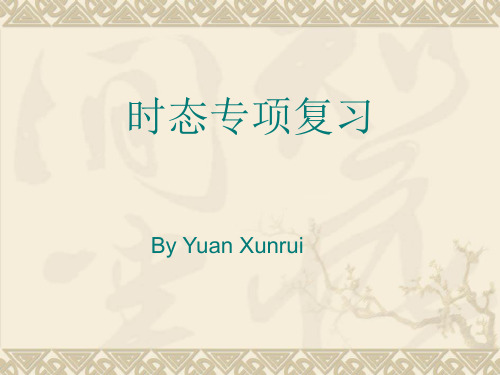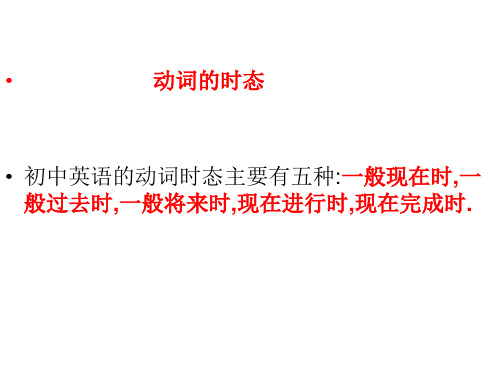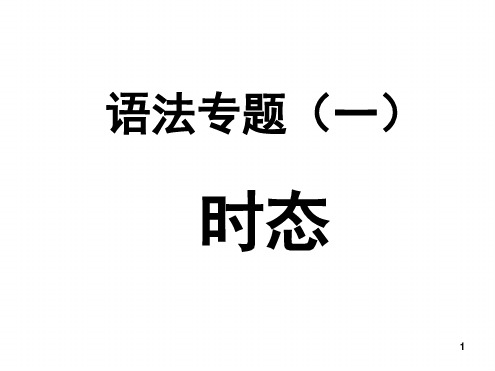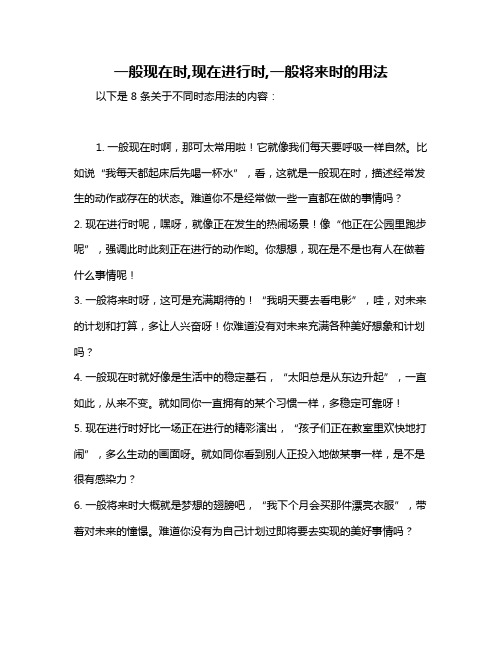最新一般现在时,现在进行时,一般将来时
如何区分一般现在时

如何区分一般现在时、现在进行时、一般过去时、一般将来时、一、一般现在时:概念:经常、反复发生的动作或行为及现在的某种状况。
例:He listens to the radio every evening.时间状语:always, usually, often, sometimes, every week (day, year, month…), once a week, on Sunday, etc.基本结构:①be动词;②行为动词否定形式:①am/is/are +not;②此时态的谓语动词若为行为动词,则在其前加don't,如主语为第三人称单数,则用doesn't,同时还原行为动词。
一般疑问句:①把be动词放于句首;②用助动词do提问,如主语为第三人称单数,则用does,同时,还原行为动词。
二、一般过去时:概念:过去某个时间里发生的动作或状态;过去习惯性、经常性的动作、行为。
例:I wasborn on April 2, 1986.时间状语:ago, yesterday, the day before yesterday, last week(year, night, month…), in 1989, just now, at the age of 5, one day, once upon a time, etc.基本结构:①be动词;②行为动词否定形式:①was/were +not;②在行为动词前加didn't,同时还原行为动词。
一般疑问句:①was或were放于句首;②用助动词do的过去式did 提问,同时还原行为动词。
三、现在进行时:概念:表示现阶段或说话时正在进行的动作及行为。
时间状语:at the monment look listen\now例:The woman is talking to the doctor.时间状语:now, at this time, these days, etc.基本结构:am /is/are +doing否定形式:am /is/are +not +doing.一般疑问句:把be动词放于句首。
小学一般现在时-过去式-现在进行时-将来时讲解

四种时态的比较一般过去时1.一般过去时表示过去某个时间发生的动作或存在的状态,常和表示过去的时间状语连用。
一般过去时也表示过去经常或反复发生的动作。
2.Be动词在一般过去时中的变化:⑴am 和is在一般过去时中变为was。
(was not=wasn’t)⑵are在一般过去时中变为were。
(were not=weren’t)⑶带有was或were的句子,其否定、疑问的变化和is, am, are一样,即否定句在was或were后加not,一般疑问句把was或were调到句首。
3.句中没有be动词的一般过去时的句子否定句:didn’t +动词原形,如:Jim didn’t go home yesterday.一般疑问句:在句首加did,句子中的动词过去式变回原形。
如:Did Jim go home yesterday?特殊疑问句:⑴疑问词+did+主语+动词原形?如:What did Jim do yesterday?⑵疑问词当主语时:疑问词+动词过去式?如:Who went to home yesterday?4、规则动词的变化:5.不规则动词过去式:原形过去式原形过去式原形过去式原形过去式sweep swept teach taught have had go went keep kept think thought do did find found sleep slept buy bought eat ate say said feel felt drink drank is/am was take took read read give gave are were mean meant put put sing sang drive drove meet met cut cut begin began speak spoke make made let let ring rang write wrote see saw fly flew run ran ride rode come came draw drew sit sat hear heard tell told grow grew learn learned/ learnt get got know knew 【练习巩固】( )1.The two __________in the same class last year.A. areB. wasC. wereD. be( )2.---Where______ you______ ?----I went to buy some food for supper.A.are … goB.did … goC.do … goD. will … go( )3. "Why _______ she _______ angry?" "Because he _____ at him just now. A. did… get, shouted B. has…got…shoutedC. did… get… has shoutedD. has…got…has shouted( )4.__________ that worker __________in a shoe factory a year ago?A. Do, workB. Did, workedC. Did, workD. Does work ( )5_____ you ______ the film before ? Where ____ you _____ it ?A. Have… seen… did… seeB. Did…see…die…watchC. Have…seen… have… seenD. Did…see…have…seen二、填空1.Tom _______ (visit) a farm last week.2. The twins _______ (water) the flowers in the garden yesterday morning.3. I _______ (watch) a film with my friend last Friday.4. My father _______ (be) in London last year.5. What_______ (do) you do three days ago?6. _______ (be) there any parks here in 1950?7. What_________(do) you do just now? I __________ (wash) my clothes.三.按要求改写句子。
一般现在时表将来 一般现在时和现在进行时表将来有什么区别-如题.

一般现在时表将来一般现在时和现在进行时表将来有什么区别?如题.各位读友大家好,此文档由网络收集而来,欢迎您下载,谢谢下列动词:come,go,arrive,leave,start,begin,return的一般现在时表将来。
一般现在时表将来这主要用来表示在时间上已确定或安排好的事情。
The train leaves at six tomorrow morning。
When does the bus star?It stars in ten minutes。
用现在进行时表将来时(表示按计划安排要发生的事件。
) 一般现在时表将来一般现在时代替将来时时间状语从句,条件句中,从句用一般现在时代替将来时When,while,before,after,till,once,as soon as,so long as,by the time,if,in case (that),unless,even if,whether,the moment,the minute,the day,theyear,immediately He is going to visit her aunt the day he arrives in Beijing。
他一到北京,就去看他姨妈。
典型例题(1)He said he________me a present unless I_______ in doing the experiment。
A。
had not given; had not succeeded B。
would not give; succeed C。
will not give; succeed D。
would not give; will succeed。
答案B。
在时间,条件或让步主语从句中一般不用将来时。
本题有He said,故为过去式。
主句用将来时,故选B。
此处用一般过去式代替了过去将来时。
(2) 表示现在已安排好的未来事项,行程等活动。
七个时态:一般现在时、现在进行时、将来时:begoingto(=will)、一般过去时、过去进行时、过去完成时、现在

主要要一下七个时态:一般现在时、现在进行时、将来时:be goingto(= will )、一般过去时、过去进行时、过去完成时、现在完成进行时。
(1)一般现在时1.一般现在时表示经常或习惯性的动作,也可表示现在的状态或主语具备的性格和能力。
2.一般现在时中,没有be动词和情态动词,主语为第三人称单数的肯定句,动词要按规则加上s,主语是非第三人称单数的肯定句,动词用原形。
3.在一般现在时中,句中有be动词或情态动词时,否定句在be 动词和情态动词后加not,一般疑问句将be动词或情态动词放在句4.在一般现在时中,句中没有be动词或情态动词时,主语为第三人称单数的否定句在动词前加does+not (doesn’t),一般疑问句在句首加does,句子中原有动词用原形;主语为非第三人称单数,否定句用do+not (don’t),一般疑问句在句首加do,句子中动词用原形。
5.动词+s的变化规则1)一般情况下,直接加-s,如:cook-cooks, milk-milks2)以s. x. sh. ch. o结尾,加-es,如:guess-guesses,wash-washes,watch-watches, go-goes3)以“辅音字母+y”结尾,变y为i, 再加-es,如:study-studies6. 句中be动词和动词一般情况下只能有一种而且也必须有一种。
如:The childrenare very happy on Christmas Day .7.一般现在时中的be动词:一般用原形:am is aream用于第一人称单数(I);is用于第三人称单数(he she it和其他人名或称谓,如:Ben his sister等);are用于第二人称单数(you)和所有复数(包括第一人称复数we、第二人称复数you;第三人称复数they和其他复数,如his parents等)。
8.一般过去时中的动词:有两种情况:第一种情况:主语是第三人称单数(he she it 和其他,如Helen 、her cousin 等),动词后一般加s或es。
一般现在时,现在进行时,一般将来时

一般现在时一、含义:表示事物(或人)的特征、状态,或表示经常性或习惯性的动作。
在一般现在时中,当主语是第三人称单数时,谓语动词要用第三人称单数形式,即常在动词原形后加-s或-es。
注:常见的词有:always、usually 、often、sometimes 等频率副词。
二、第三人称单数形式构成规则:1、大多数动词在词尾加“S ”如:read —reads2、以辅音字母加“ y ”结尾的,要先将“ y ”变为“ i ”,然后在加“ es ”;以元音字母加“ y ”结尾的,直接加“ S ” 如: fly —flies play-plays3、以“ s, x, ch, sh ” 结尾的,在词尾加“ es ”如:watch —watches4、以“ o”结尾的动词,加“ es”,如:go —goes5、以不发音字母“ e”结尾的开音节词,加“s”女口:make-makes6、特殊:1 be动词包括:am , is , are第三人称单数为is 2 have -has三、写出下列动词的第三人称单数形式:visit--guess-- take--go--rush-- feel-- cook- wash--fly-- be-- say-- run--do-- worry- -liv --watch--enjoy-- have-- like-- play--use-- teach- ■buy-- studydrin k-- stay make--pla nt--trip-- carry-- come-- cry--四、用括号内动词的适当形式填空。
1. She often __________ (have)lunch at home.2. Sarah and Tom _________ (be) in Class One.3. We _________ (not watch) TV on Mon day.4. Oliver __________ (not go) to school on Sun day.5. ________ they __________ (like)playi ng football?6. What _________ they often ________ (do) on Saturdays?7. _________ your pare nts _________ (read) n ewspapers?8. The girl __________ (teach) us En glish on Sun days.9. She and I __________ (take) a walk together every evening.10. There __________ (be) some water in the bottle.11. Mike _________ (like) cooking.12. He ________ (have) two new books.13. My sister _________ (look) after her baby carefully.14. You always _________ (do) your homework well.15. I _________ (be) ill. I 'min stay in gbed.16. She _________ (go) to school from Mon day to Friday.17. Liu Tao _________ (do) not like PE.18. The child often _________ (watch) TV in the evening.19. —What day _________ (be) it today?—It ' s Saturday20. —How _________ Dad _________ (feel)?—He __________ (feel) not well.21. —Where _________ he __________ (work)? —He ___________ (work) at sea.现在进行时一、含义:表示正在做某事。
一般现在时、现在进行时、一般将来时

诀窍:
用do、does时 后面的动词用原形
用be动词时后面的动词用ing形式
What ____ you _____ (do) now? are doing does do What _____ he usually _______(do) ? is going to wait Who _______ he ___________ (wait) for in 2 hours ?
没有情态动词,有be动词的在be动词后+not 既没有情态动词,也没有be动词的,找助 动词do或does
Some 变为any and变为or
句子如何变疑问句
有情态动词的,把情态动词提前
没有情态动词,有be动词的把be动词提前( I am … we are…..)
既没有情态动词,也没有be动词 的,找助动词do或does
在将来的时间里要发生的动作,或计划、打算 做某事。
标志词:
1、tomorrow in the future 2、next 3、in 2 days 4、soon in 2014
(与现在相对比,所有表示将来的时间状语)
动词结构:
be going to do
There be 结构的将来时
There is going to be
2 出动词结构
动词原形或单三 形式
7 Don’t talk!
4、at this time
5、描述图片时 6、where is Tom?He is watching TV in the living room。 1、tomorrow 2、next 3、in 2 days 4、soon (与现在相对比,所有将来的时间状语) in 2014 in the future
五种时态一般现在时的_一般过去式_现在进行_现在完成时_一般将来时

• • • • • • • • • • • • • • • • • • • • • • • • • • •
( ) 19. The day after tomorrow they ________ a volleyball match. A. will watching B. watches C. is watching D. is going to watch ( ) 20. There ________ a birthday party this Sunday. A. shall be B. will be C. shall going to be D. will going to be ( ) 21. They ________ an English evening next Sunday. A. are having B. are going to have C. will having D. is going to have ( ) 22. ________ you ________ free next Sunday? A. Will; are B. Will; be C. Do; be D. Are; be ( ) 23. He ________ there at ten tomorrow morning. A. will B. is C. will be D. be ( ) 24. ________ your brother ________ a magazine from the library? A. Are; going to borrow B. Is; going to borrow C. Will; borrows D. Are; going to borrows ( ) 25. – Shall I come again tomorrow afternoon? –________ (好的). A. Yes, please B. Yes, you will. C. No, please. D. No, you won’t. ( ) 26. It ________ the year of the horse next year. A. is going to be B. is going to C. will be D. will is ( ) 27. ________ open the window? A. Will you please B. Please will you C. You please D. Do you
初中英语八种时态讲解最新优质ppt课件

时态
1
一般现在时 一般过去时 现在进行时 过去进行时 现在完成时 过去完成时 一般将来时 过去将来时 2
一般现在时
3
一、一般现在时:
概念:经常、反复发生的动作或行为及现
在的某种状况。
时间状语:
always, usually, often, sometimes, every
(day, year, month…), once a week, on Sun
10
are) free tomorrow.
10.I will go there when I _____(have will have, has) time tomorrow. 11.He won't come to the party unle he _____(be, will be, am, is, are) invi 12.I'll wait here until my mother ____(come, comes, will come) back. 13.Please return the book to the lib as soon as you ______(finish, finishe will finish) reading it. 14.Once you _____(see, sees, will see him, you will never forget him.
stud→y studies carry→carries fly→flies
9
1. He______(be, am, is, are) a teacher at No. 2 Middle School. 2. He______(have, has) classes in the afternoon. 3.He______(get, gets) up at half past six every morning. 4.He always _____(come, comes ) to school on time. 5.He ______(study, studies) very hard at his lesson. 6. One and two _____(be, is, are) three. 7. Blue and yellow _____(make, makes) green. 8.The earth _____(move, moves) round the sun. 9.I will go there if I ____( be, will be, am, is,
一般现在时,现在进行时,一般将来时的用法

一般现在时,现在进行时,一般将来时的用法以下是 8 条关于不同时态用法的内容:
1. 一般现在时啊,那可太常用啦!它就像我们每天要呼吸一样自然。
比如说“我每天都起床后先喝一杯水”,看,这就是一般现在时,描述经常发生的动作或存在的状态。
难道你不是经常做一些一直都在做的事情吗?
2. 现在进行时呢,嘿呀,就像正在发生的热闹场景!像“他正在公园里跑步呢”,强调此时此刻正在进行的动作哟。
你想想,现在是不是也有人在做着什么事情呢!
3. 一般将来时呀,这可是充满期待的!“我明天要去看电影”,哇,对未来的计划和打算,多让人兴奋呀!你难道没有对未来充满各种美好想象和计划吗?
4. 一般现在时就好像是生活中的稳定基石,“太阳总是从东边升起”,一直如此,从来不变。
就如同你一直拥有的某个习惯一样,多稳定可靠呀!
5. 现在进行时好比一场正在进行的精彩演出,“孩子们正在教室里欢快地打闹”,多么生动的画面呀。
就如同你看到别人正投入地做某事一样,是不是很有感染力?
6. 一般将来时大概就是梦想的翅膀吧,“我下个月会买那件漂亮衣服”,带着对未来的憧憬。
难道你没有为自己计划过即将要去实现的美好事情吗?
7. 一般现在时宛如生活的节拍器,“他总是很乐观”,这就是一贯的状态呀。
就好像身边那个总是乐呵呵的朋友,总是如此呢!
8. 现在进行时如同跳动的火焰,“妈妈正在厨房忙着做饭”,热烈而充满活力。
想想你身边正在忙碌的人,是不是也是这样活力满满呀!
我觉得时态真的是太神奇啦,它们让我们能够准确地表达不同时间的事情和状态呢!。
一般现在时,现在进行时,一般将来时

一般现在时之巴公井开创作一、二、含义:暗示事物(或人)的特征、状态,或暗示经常性或习惯性的举措.在一般现在时中,当主语是第三人称双数时,谓语动词要用第三人称双数形式,即常在动词原形后加s或es.注:罕见的词有:always、usually、often、sometimes等频率副词.三、第三人称双数形式构陈规则:1、年夜大都动词在词尾加“S”如:read-reads2、以辅音字母加“y”结尾的,要先将“y”酿成“i”,然后在加“es”;以元音字母加“y”结尾的,直接加“S” 如: fly-flies playplays3、以“s, x, ch, sh”结尾的,在词尾加“es”如:watch-watches4、以“o”结尾的动词,加“es”,如:go-goes5、以不发音字母“e”结尾的开音节词,加“s” 如: makemakes6、特殊:○1be动词包括:am, is, are第三人称双数为is○2 have has三、写出下列动词的第三人称双数形式:visitguess takegorush feelcook washfly besay run do worrylive watch enjoy havelike playuse teachbuy study drink staymakeplanttrip carrycome cry四、用括号内动词的适当形式填空.1. She often __________(have)lunch at home.2. Sarah and Tom __________(be) in Class One.3. We__________(not watch) TV on Monday.4. Oliver __________(not go) to school on Sunday.5.__________they __________(like)playing football?6. What __________they often__________(do) on Saturdays?7. __________ your parents __________(read) newspapers?8. The girl__________(teach) us English on Sundays.9. She and I __________(take) a walk together every evening.10. There __________(be) some water in the bottle.11. Mike__________(like) cooking.12. He__________(have) two new books.13. My sister __________(look) after her baby carefully.14. You always __________(do) your homework well.15. I__________(be) ill. I’m staying in bed.16. She __________(go) to school from Monday to Friday.17. Liu Tao __________(do) not like PE.18. The child often __________(watch) TV in the evening.19. -What day __________(be) it today?-It’s Saturday20.-How__________Dad __________(feel)?-He __________(feel) not well.21.-Where__________ he __________(work)?-He __________(work) at sea.现在进行时一、含义:暗示正在做某事.注:罕见的词有:now现在、look看、listen听等.现在进行时的构成:am/is/ are+ ving是现在进行时的构成形式ving现在分词的构成:let put sit , stop shop , forget get , begin jog run swim (让我们放下来,坐下来,停止购物,忘记取得,开始跑跑跳跳) letting putting sitting stopping shopping forgetting getting beginning jogging running swimming二、写出下列动词的现在分词形式:visit put takegoget seecook washfly letsay swimdo sitlive watch enjoy haverun playuse teachbuy studydrink staymakeplantfeel stopcome cry三、用所给的动词的正确形式填空:1.The boy __________________ ( draw)a picture now.2. Listen .Some girls __________________( sing)in the classroom .3. My sister __________________ ( swim ) now.4. What __________ you__________( do ) now?5. Look . They __________________ ( have) an Engl ish lesson .6.They__________________ (not ,water) the flowers no w.7.Look! The girls__________________ (dance )in the classroom .8.What is Tom doing? She __________________ (listen ) to music.9.It’s 5:00 now. I__________________(run).10.Hear!The bird__________________(sing).一般将来时一:含义:暗示将来计划、准备、筹算做某事.二:标识表记标帜词:tonight今晚,tomorrow明天,the day after tomorrow后天,this morning/afternoon/evening今天早上/下午/晚上,next week/weekend/month/year下一周/下一周末/下个月/下年, in two years两年后, three days later三天以后等.三:结构:(1)will/shall+do(动词原形)(will可用于所有人称,shall只用于第一人称I和we)(2)be going to+do(动词原形)(beam/is/are根据主语的变动而变动)四、练习:填空.1. 我筹算明天和朋友去野炊. I_____ _______ _________ have a picnic with my friends.I ________ have a picnic with my friends.2. 下个星期一你筹算去干嘛? 我想去打篮球.What ________ ________ _________ _________ _________ next Monday?I _______ ______ _____ play basketball.What _________ you do next Monday? I ________ p lay basketball.3. 你妈妈这个周末去购物吗?是,她要去买一些水果._____ your mother _______ ________ go shopping thi s ___________? Yes, she _________.She ______ ________ __________ buy some fruit.4. 你们筹算什么时候见面.What time _______ you _________ __________ meet?五、改句子.1、Tom is going to go camping.(改否定)→Tom ________ going to go camping.2. I’ll go and join them.(改否定)→I _______ go ______ join them.3. I’m going to get up at 6:30 tomorr ow.(改为一般疑问句)→________ _______ ________ to get up at 6:30 tomor row?4.We will meet at school at 10:30.(改为一般疑问句)→_______ ________ meet at the bus stop at 10:3 0.5、. She is going to listen to music after schoo l.(对划线部份提问)→________ _______ she ________ ________ _________ af ter school?六:用所给词的适当形式填空.1.Today is a sunny day. We ___________________ ( have) a picnic this afternoon.2. My brother _______________ (go) to Shanghai next week.3. Tom often ______________(go) to school on foot.But today is rain. He ______________ (go) to school by bike.4. What do you usually do at weekends? I usually________ (watch) TV.5. It’s Friday today. What _____she _________ (do) this weekend? She ___________(watch) TV .名词的复数形式1.一般情况下,直接加s,如:bookbooks, bagbags, catcats, househouses2.以s. x. sh. ch结尾,加es,如:busbuses, boxboxes, watchwatches3.以“辅音字母+y”结尾,变y为i, 再加es;以“元音字母+y”结尾,直接加s如:familyfamilies, toytoys4.以o结尾,一般在词尾加es.如:tomatotomatoes,potatopotatoes5.以“f或fe”结尾,变f或fe为v, 再加es,如:knifeknives,wifewives等6.不规则名词复数:(1)特殊变换:manmen, womanwomen, policemanpolicemen, policewomanpolicewomen, mousemice,childchildren, footfeet,.toothteeth(2)单复数同行:fishfish, peoplepeople, ChineseChinese, JapaneseJapanese sheepsheep breadbread等等.(3)国人变复数:口诀“中日不变英法变,其余s加后面”:ChineseChinese,JapaneseJapanese,EnglishmanEnglishmen FrenchmanFrenchmen AmericanAmericans一、写出下列名词的复数形式4.piano___________5.child___________6.shelf ____________10.toy__________ 11.foot __________12.radio__________13.photo__________ 14.tomato___________ 15.woman___________16.knife__________ 17.sheep__________18.ship__________二、用所给的单词的复数的正确形式填空:1> There are three_____________(chair) in the class room.2> These_____________ (tomato) are red.3> My brother looks after two_____________ (baby)4> My father likes to eat_____________ (potato).5> Chinese_____________ (people)like to eat noodles.6> I have a lot of _____________ (toy) in my be droom.7> My mother wash_____________ (dish) in the kitchen.8> I have two_____________ (pencilbox).9> There are some_____________ (bus)in the street.10> Monster has eight_____________ (foot).三、按适当形式填空.手写。
一般过去时、一般现在时、一般将来时和现在进行时和主谓结构

一般过去时
1.我吃了 2.你在家吃的 3.你父母没有告诉你 4.他昨晚没回来 5.你没有跟我说 6.她们前天走的
一般将来时
1. 我会买一本书 2. 我们准备8点出发 3. 你将要吃一个苹果 4. Tom和David打算去餐馆吃饭 5. Lily不打算告诉她父母
现在进行时
1. 你正在上课 2. 他正在玩游戏 3. 我在上班 4. 我们在树下玩耍 5. 她们在看电视 6. 我在开玩笑 7. 朋友们在等我
“时” 是“现在、过去、将来 、过去将来”四种时间
“态”是行为或状态发生时 所呈现的状态
“时态”表示行为、动作、 状态在各种时间条件下的动词 形式
2. 时态的种类
16种时态和语态
小学阶段要掌握的时态
一现在时
四种
一般过去时
一般将来时
现在进行时
初中阶段要掌握的时态
一般现在时 一般过去时 八种 一般将来时 过去将来时
一 般 过 去 时
四种基本时态
一般将来时:还未发生的动作 现在进行时:正在进行的动作 一般过去时:过去发生的动作 一般现在时:反复发生的动作
4. 四种时态的判定
一般现在时
1. 我通常7点起床 2. 学生们每天学习 3. Anna和Grace周末一般要上课 4. 他平常吃面 5. 他们上学总是迟到 6. 他老是笑 7. David经常放屁
句子的本质
㈠ 10种词性(词类) ㈡ 8种句子成分 ㈢ 5种句子结构
Grammar
Declarative Sentence 陈述句
By Aubin
陈述句
一、学习语法的“三座大山” 二、句子的本质 三、四种基本时态 四、运用四种基本时态造陈述句
三、四种基本时态
一般过去时、一般现在时、一般将来时和现在进行时和主谓宾结构

④名词+is/are going to +及物动词原 形+宾语
David将要给我打电话。 Lisa和Lucy准备放学后玩游戏。
一般将来时 主谓宾结构的练习
请查看名词表和动词表,自己造 两个句子。
㈣ 现在进行时 主谓宾结构
现在进行时
①人称代词主格(主语)
B: Teacher told us to write an essay on The Result of Laziness, and I turned in a blan主语)+及物动词 过去式(谓语)+宾语
我昨天看了一本书 他去年没有买一台电脑
Let’s review
四种基本时态 主
要 内
判定时态的依据
容 四种基本时态和主谓结构
四种基本时态
一般将来时:还未发生的动作 现在进行时:正在进行的动作 一般过去时:过去发生的动作 一般现在时:反复发生的动作
判定时态的依据
1.情景/场景(具体的语境) 2.时间(过去、现在、将来) 3.假设肯定回答 4. 关键词:一般、了、打算、在……
2.
①人称代词主格(主语)+will+ 及物动词原形+宾语 ②名词(主语)+ will+及物动
主
am/is/are going
谓 to+动词原形 宾
主语+复合谓语+宾语
词原形+宾语 ③人称代词主格+am/is/are going to+及物动词原形+宾语 ④名词+is/are going to +及物
1. 及物动词过去式(谓语) 主 谓 ②名词(主语)+不及物动词
一般现在时 现在进行时 一般将来时 一般过去时四大时态讲解表格对比总结

四大时态总结--------一般现在时、一般将来时、一般过去时、现在进行时一、一般现在时一般现在时表示经常性或习惯性的动作,常与表示频度的时间状语连用,如often, usually, always, sometimes, never, seldom, every week/day/year/month..., once a week, on Sundays等。
动词用原形。
当主语第三人称单数的动词变化规则:(只有在第三人称(he, she, it, 一个人名)为主语的肯定句中,动词才用三单式)(1)一般情况下,直接加s runs gets likes(2)结尾是s, x, sh, ch, o,前为辅音字母,结尾加es watches, goes, washes, crosses, mixes, does(3)动词末尾y,前为辅音,将y改为i加es study→studies fly→flies但在y前如果为元音则直接加s buys says plays(4)不规则变形have—has二、现在进行时现在进行时表示此时此刻或现阶段正在进行的动作。
常与now, at this time, these days, Listen! Look! at this(1)直接在动词后加ing. going, starting, working.(2)去掉词尾不发音的e,再加ing. leave--leaving, make---making.注意:如果单词结尾的e发音,则不能去掉,也直接加ing. see –seeing agree - agreeing .(3) 对于动词只有一个元音,而其后跟了一个辅音字母时,双写末尾辅音字母再加ing.sitting, beginning run – running stop – stopping cut – cutting control – controlling(4)以ie结尾,把ie变y再加ing。
- 1、下载文档前请自行甄别文档内容的完整性,平台不提供额外的编辑、内容补充、找答案等附加服务。
- 2、"仅部分预览"的文档,不可在线预览部分如存在完整性等问题,可反馈申请退款(可完整预览的文档不适用该条件!)。
- 3、如文档侵犯您的权益,请联系客服反馈,我们会尽快为您处理(人工客服工作时间:9:00-18:30)。
精品好文档,推荐学习交流 仅供学习与交流,如有侵权请联系网站删除 谢谢1 一般现在时 一、含义:表示事物(或人)的特征、状态,或表示经常性或习惯性的动作。在一般现在时中,当主语是第三人称单数时,谓语动词要用第三人称单数形式,即常在动词原形后加-s或-es。
注:常见的词有:always、usually、often、sometimes等频率副词。
二、第三人称单数形式构成规则: 1、大多数动词在词尾加“S”如:read-reads 2、以辅音字母加“y”结尾的,要先将“y”变为“i”,然后在加“es”;以元音字母加“y”结尾的,直接加“S” 如: fly-flies play-plays
3、以“s, x, ch, sh”结尾的,在词尾加“es”如:watch-watches 4、以“o”结尾的动词,加“es”,如:go-goes 5、以不发音字母“e”结尾的开音节词,加“s” 如: make-makes 6、特殊:○1be动词包括:am, is, are第三人称单数为is ○2have -has
三、 写出下列动词的第三人称单数形式: visit-- guess-- take-- go-- rush-- feel-- cook-- wash-- fly-- be-- say-- run-- do-- worry-- live-- watch-- enjoy-- have-- like-- play-- use-- teach-- buy-- study-- drink-- stay-- make-- plant-- trip-- carry-- come-- cry--
四、用括号内动词的适当形式填空。 1. She often __________ (have)lunch at home. 2. Sarah and Tom __________ (be) in Class One. 3. We__________ (not watch) TV on Monday. 4. Oliver __________ (not go) to school on Sunday. 精品好文档,推荐学习交流 仅供学习与交流,如有侵权请联系网站删除 谢谢2 5.__________ they __________ (like)playing football? 6. What __________ they often__________ (do) on Saturdays? 7. __________ your parents __________ (read) newspapers? 8. The girl__________ (teach) us English on Sundays. 9. She and I __________ (take) a walk together every evening. 10. There __________ (be) some water in the bottle. 11. Mike__________ (like) cooking. 12. He__________ (have) two new books. 13. My sister __________ (look) after her baby carefully. 14. You always __________ (do) your homework well. 15. I__________ (be) ill. I’m staying in bed. 16. She __________ (go) to school from Monday to Friday. 17. Liu Tao __________ (do) not like PE. 18. The child often __________ (watch) TV in the evening. 19. -What day __________(be) it today? - It’s Saturday 20. -How__________Dad __________(feel)? -He __________(feel) not well. 21. -Where__________ he __________(work)?-He __________(work) at sea. 现在进行时 一、含义:表示正在做某事。注:常见的词有:now现在、look看、listen听等。 现在进行时的构成:am/is/ are+ v-ing是现在进行时的构成形式 v-ing现在分词的构成: 一般情况 +ing walking 以不发音字母e结尾的单词 去e, +ing having 以重读闭音节结尾的单词,末尾只有一个辅音字母时. 双写词尾字母+ing putting
总结小学阶段需要双写最后一个字母再加ing的现在分词: 精品好文档,推荐学习交流 仅供学习与交流,如有侵权请联系网站删除 谢谢3 let put sit , stop shop , forget get , begin jog run swim (让我们放下来,坐下来,停止购物,忘记取得,开始跑跑跳跳) letting putting sitting stopping shopping forgetting getting beginning jogging running swimming
二、 写出下列动词的现在分词形式: visit-- put-- take-- go-- get-- see-- cook-- wash-- fly-- let-- say-- swim-- do-- sit-- live-- watch-- enjoy-- have-- run-- play-- use-- teach-- buy-- study-- drink-- stay-- make-- plant-- feel-- stop-- come-- cry--
三、用所给的动词的正确形式填空: 1.The boy __________________ ( draw)a picture now. 2. Listen .Some girls __________________( sing)in the classroom . 3. My sister __________________ ( swim ) now. 4. What __________ you__________( do ) now? 5. Look . They __________________ ( have) an English lesson . 6.They__________________ (not ,water) the flowers now. 7.Look! The girls__________________ (dance )in the classroom . 8.What is Tom doing? She __________________ (listen ) to music. 9.It’s 5:00 now. I__________________ (run). 10.Hear!The bird__________________(sing).
一般将来时 精品好文档,推荐学习交流 仅供学习与交流,如有侵权请联系网站删除 谢谢4 一:含义:表示将来计划、准备、打算做某事。 二:标志词:tonight今晚,tomorrow明天,the day after tomorrow后天,this morning/afternoon/evening今天早上/下午/晚上,next week/weekend/month/year下一周/下一周末/下个月/下年, in two years两年后, three days later三天以后等。
三:结构: (1)will/shall+do(动词原形)(will可用于所有人称,shall只用于第一人称I和we) (2) be going to+do(动词原形)(be--am/is/are根据主语的变化而变化)
四、练习:填空。 1. 我打算明天和朋友去野炊。 I_____ _______ _________ have a picnic with my friends.
I ________ have a picnic with my friends. 2. 下个星期一你打算去干嘛? 我想去打篮球。 What ________ ________ _________ _________ _________ next Monday? I _______ ______ _____ play basketball. What _________ you do next Monday? I ________ play basketball. 3. 你妈妈这个周末去购物吗?是,她要去买一些水果。 _____ your mother _______ ________ go shopping this ___________? Yes, she _________.
She ______ ________ __________ buy some fruit. 4. 你们打算什么时候见面。 What time _______ you _________ __________ meet?
五、改句子。 1、Tom is going to go camping.(改否定)→ Tom ________ going to go camping.
2. I’ll go and join them.(改否定)→ I _______ go ______ join them. 3. I’m going to get up at 6:30 tomorrow.(改为一般疑问句)→ ________ _______ ________ to get up at 6:30 tomorrow? 4. We will meet at school at 10:30.(改为一般疑问句)→
